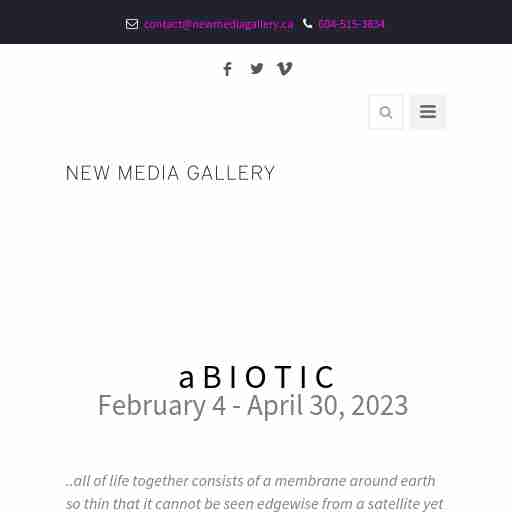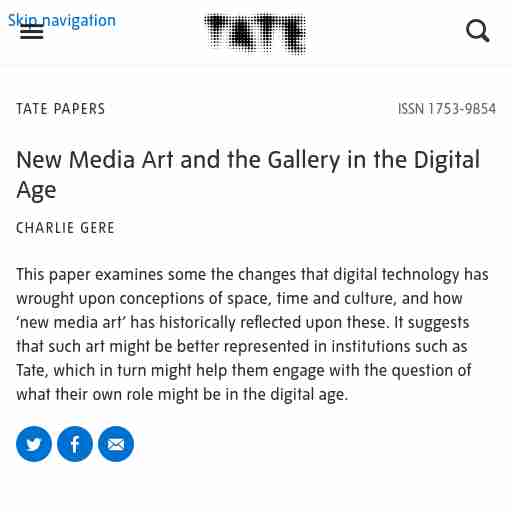The world of art is constantly evolving, with new forms of expression emerging as technology advances. One such form is new media art, which utilizes digital technologies to create interactive and immersive experiences for viewers. New media art galleries are dedicated spaces that showcase these innovative works, providing a platform for artists to explore the intersection of art and technology.
New media art encompasses a wide range of mediums, including video installations, virtual reality experiences, interactive sculptures, and more. These works often incorporate elements such as sound, light, and motion to create immersive environments that engage the viewer in a unique way. Unlike traditional forms of art that are static and passive, new media art requires active participation from the audience.
Technology plays a crucial role in the creation and presentation of new media art. Artists use various software programs and hardware devices to design their work and bring it to life. For example, virtual reality headsets can transport viewers to another world, while motion sensors can track their movements and trigger different responses within the artwork.
Additionally, new media art galleries often employ advanced audiovisual systems to enhance the viewing experience. These may include high-resolution projectors or surround sound speakers that immerse visitors in the artwork.
New media art galleries serve an important purpose in our society by providing a space for artists to experiment with technology and push boundaries in their creative expression. They also offer a unique opportunity for audiences to engage with cutting-edge works that challenge their perceptions of what art can be.
Furthermore, new media art galleries help to bridge the gap between technology and culture by showcasing works that integrate both. This can help to make technology more accessible and understandable to a wider audience, while also elevating the status of new media art as a legitimate form of artistic expression.
There are many new media art galleries around the world that showcase innovative works by artists from diverse backgrounds. Here are just a few examples:
In addition to showcasing new media artworks, some galleries also offer products related to these works. For example, virtual reality headsets or interactive installations may be available for purchase so that visitors can continue to engage with the artwork outside of the gallery space.
Other products may include books or catalogs that provide further information about the artists and their work. These can be valuable resources for anyone interested in learning more about new media art and its impact on contemporary culture.
New media art galleries are an exciting and innovative addition to the world of contemporary art. By showcasing works that integrate technology and multimedia elements, these spaces offer a unique opportunity for audiences to engage with cutting-edge artworks that challenge their perceptions of what art can be. Whether you're an artist, collector, or simply curious about the intersection of art and technology, visiting a new media art gallery is sure to be an enlightening experience.

The largest gallery contains Infra/Supra (2016/2022) by Icelandic artist, Finnbogi Pétursson. Spanning one wall is an expansive, shallow, ground-level pool, ... contact@newmediagallery.ca604-515-3834 ..all of life together consists of a membrane around earth so thin that it cannot be seen edgewise from a satellite yet so prodigiously diverse that only a tiny fraction of species have been discovered and named. E.O. Wilson Before biosphere, before life, there were only the non-living, abiotic factors and a world of water. The three installations in aBIOTIC abstract and synthesize the ethereal, scientific and mysterious behaviours of water. Technology, sound, chemistry and time are used to further reveal or extend fundamental patterns and laws.. In this exhibition phases of water are a physical, chemical and structural material to be used as an expressive and conceptual tool: liquid, gas, solid; water, steam, bubbles, ice. We see water mirrored, suspended, projected and directed. Water is the surface, the object and the medium, over, through and around which play precise exchanges of light, movement and sound. Manufactured, incidental and composed sound is integrated into this watery fabric becoming a defining component of each installation. The first work one encounters is The Long Now (2015), by Cologne-based Verena Friedrich. The intimate gallery, at the centre of the exhibition, contains this technology-based still-life, framed inside a clear perspex box, sitting on a table. A single, perfect bubble floats, persisting long after all other bubbles would have collapsed; the artificial atmosphere holds it aloft for a variable and uncertain length of time. Friedrich’s innovative use of technology & science greatly prolongs the normal life of each fragile sphere. But it eventually succumbs. The technology that produces the bubble and evacuates the atmosphere is triggered again and again; the brief, violent sound of working technology...followed by... the wonder. The work builds on a long art tradition of depicting soap bubbles in still life & portraiture. Known as Vanitas, the bubble serves to remind us that life is transient and our demise is certain.
---
You've been blocked by network security. To continue, log in to your Reddit account or use your developer token If you think you've been blocked by mistake, file a ticket below and we'll look into it.

Oct 9, 2021 ... I've been trying to relentlessly look into them but as of yet I haven't come across any which feature digital art & are openly accepting as well. You've been blocked by network security. To continue, log in to your Reddit account or use your developer token If you think you've been blocked by mistake, file a ticket below and we'll look into it.

This paper examines some the changes that digital technology has wrought upon conceptions of space, time and culture, and how 'new media art' has ... phantomjs://platform/webpage.js:286 in _onPageOpenFinished phantomjs://platform/webpage.js:286 in _onPageOpenFinished phantomjs://platform/webpage.js:286 in _onPageOpenFinished phantomjs://platform/webpage.js:286 in _onPageOpenFinished Research Tate Papers Tate Papers no.2 New Media Art and the Gallery in the Digital Age New Media Art and the Gallery in the Digital Age This paper examines some the changes that digital technology has wrought upon conceptions of space, time and culture, and how ‘new media art’ has historically reflected upon these. It suggests that such art might be better represented in institutions such as Tate, which in turn might help them engage with the question of what their own role might be in the digital age. Detail of screenshot of home page The digital culture we now live in was hard to imagine twenty years ago, when the Internet was hardly used outside science departments, interactive multimedia was just becoming possible, CDs were a novelty, mobile phones unwieldy luxuries and the World Wide Web did not exist. The social and cultural transformations made possible by these technologies are immense. During the last twenty years, these technological developments have begun to touch on almost every aspect of our lives. Nowadays most forms of mass media, television, recorded music and film are produced and even distributed digitally; and these media are beginning to converge with digital forms, such as the Internet, the World Wide Web, and video games, to produce a seamless digital mediascape.